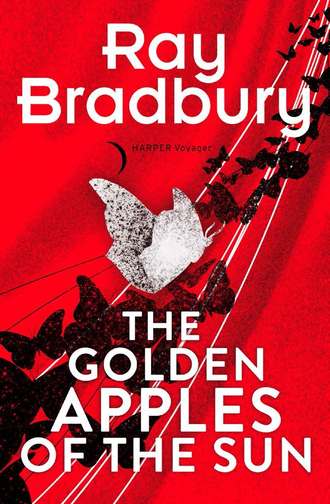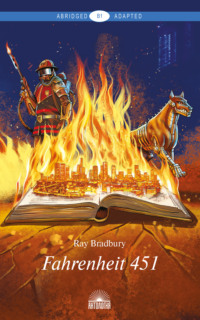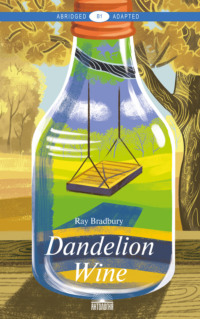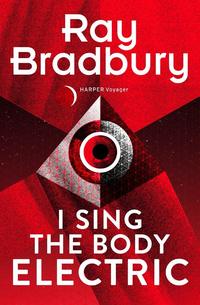
Полная версия
Golden Apples of the Sun
“Was there any special reason for selecting French chocolate ice cream to spoon into the broadcasting unit?”
Brock thought about it and smiled. “It’s my favorite flavor.”
“Oh,” said the doctor.
“I figured, hell, what’s good enough for me is good enough for the radio transmitter.”
“What made you think of spooning ice cream into the radio?”
“It was a hot day.”
The doctor paused.
“And what happened next?”
“Silence happened next. God, it was beautiful. That car radio cackling all day, Brock go here, Brock go there, Brock check in, Brock check out, okay Brock, hour lunch, Brock, lunch over, Brock, Brock, Brock. Well, that silence was like putting ice cream in my ears.”
“You seem to like ice cream a lot.”
“I just rode around feeling of the silence. It’s a big bolt of the nicest, softest flannel ever made. Silence. A whole hour of it. I just sat in my car; smiling, feeling of that flannel with my ears. I felt drunk with Freedom!”
“Go on.”
“Then I got the idea of the portable diathermy machine. I rented one, took it on the bus going home that night. There sat all the tired commuters with their wrist radios, talking to their wives, saying, ‘Now I’m at Forty-third, now I’m at Forty-fourth, here I am at Forty-ninth, now turning at Sixty-first.’ One husband cursing, ‘Well, get out of that bar, damn it, and get home and get dinner started, I’m at Seventieth!’ And the transit-system radio playing ‘Tales from the Vienna Woods,’ a canary singing words about a first-rate wheat cereal. Then—I switched on my diathermy! Static! Interference! All wives cut off from husbands grousing about a hard day at the office. All husbands cut off from wives who had just seen their children break a window! The ‘Vienna Woods’ chopped down, the canary mangled! Silence! A terrible, unexpected silence. The bus inhabitants faced with having to converse with each other. Panic! Sheer, animal panic!”
“The police seized you?”
“The bus had to stop. After all, the music was being scrambled, husbands and wives were out of touch with reality. Pandemonium, riot, and chaos. Squirrels chattering in cages! A trouble unit arrived, triangulated on me instantly, had me reprimanded, fined, and home, minus my diathermy machine, in jig time.”
“Mr. Brock, may I suggest that so far your whole pattern here is not very—practical? If you didn’t like transit radios or office radios or car business radios, why didn’t you join a fraternity of radio haters, start petitions, get legal and constitutional rulings? After all, this is a democracy.”
“And I,” said Brock, “am that thing called a minority. I did join fraternities, picket, pass petitions, take it to court. Year after year I protested. Everyone laughed. Everyone else loved bus radios and commercials. I was out of step.”
“Then you should have taken it like a good soldier, don’t you think? The majority rules.”
“But they went too far. If a little music and ‘keeping in touch’ was charming, they figured a lot would be ten times as charming. I went wild! I got home to find my wife hysterical. Why? Because she had been completely out of touch with me for half a day. Remember, I did a dance on my wrist radio? Well, that night I laid plans to murder my house.
“Are you sure that’s how you want me to write it down?”
“That’s semantically accurate. Kill it dead. It’s one of those talking, singing, humming, weather-reporting, poetry-reading, novel-reciting, jingle-jangling, rockaby-crooning-when-you-goto-bed houses. A house that screams opera to you in the shower and teaches you Spanish in your sleep. One of those blathering caves where all kinds of electronic Oracles make you feel a trifle larger than a thimble, with stoves that say, ‘I’m apricot pie, and I’m done,’ or ‘I’m prime roast beef, so baste me!’ and other nursery gibberish like that. With beds that rock you to sleep and shake you awake. A house that barely tolerates humans, I tell you. A front door that barks: ‘You’ve mud on your feet, sir!’ And an electronic vacuum hound that snuffles around after you from room to room, inhaling every fingernail or ash you drop. Jesus God, I say, Jesus God!”
“Quietly,” suggested the psychiatrist.
“Remember that Gilbert and Sullivan song—’I’ve Got It on My List, It Never Will Be Missed’? All night I listed grievances. Next morning early I bought a pistol. I purposely muddied my feet. I stood at our front door. The front door shrilled, ‘Dirty feet, muddy feet! Wipe your feet! Please be neat!’ I shot the damn thing in its keyhole. I ran to the kitchen, where the stove was just whining, ‘Turn me over!’ In the middle of a mechanical omelet I did the stove to death. Oh, how it sizzled and screamed, ‘I’m shorted!’ Then the telephone rang like a spoiled brat. I shoved it down the Insinkerator. I must state here and now I have nothing whatever against the Insinkerator; it was an innocent bystander. I feel sorry for it now, a practical device indeed, which never said a word, purred like a sleepy lion most of the time, and digested our leftovers. I’ll have it restored. Then I went in and shot the televisor, that insidious beast, that Medusa, which freezes a billion people to stone every night, staring fixedly, that Siren which called and sang and promised so much and gave, after all, so little, but myself always going back, going back, hoping and waiting until—bang! Like a headless turkey, gobbling, my wife whooped out the front door. The police came. Here I am!”
He sat back happily and lit a cigarette.
“And did you realize, in committing these crimes, that the wrist radio, the broadcasting transmitter, the phone, the bus radio, the office intercoms, all were rented or were someone else’s property?”
“I would do it all over again, so help me God.”
The psychiatrist sat there in the sunshine of that beatific smile.
“You don’t want any further help from the Office of Mental Health? You’re ready to take the consequences?”
“This is only the beginning,” said Mr. Brock. “I’m the vanguard of the small public which is tired of noise and being taken advantage of and pushed around and yelled at, every moment music, every moment in touch with some voice somewhere, do this, do that, quick, quick, now here, now there. You’ll see. The revolt begins. My name will go down in history!”
“Mmm.” The psychiatrist seemed to be thinking.
“It’ll take time, of course. It was all so enchanting at first. The very idea of these things, the practical uses, was wonderful. They were almost toys, to be played with, but the people got too involved, went too far, and got wrapped up in a pattern of social behavior and couldn’t get out, couldn’t admit they were in, even. So they rationalized their nerves as something else. ‘Our modern age,’ they said. ‘Conditions,’ they said. ‘Highstrung,’ they said. But mark my words, the seed has been sown. I got worldwide coverage on TV, radio, films; there’s an irony for you. That was five days ago. A billion people know about me. Check your financial columns. Any day now. Maybe today. Watch for a sudden spurt, a rise in sales for French chocolate ice cream!”
“I see,” said the psychiatrist.
“Can I go back to my nice private cell now, where I can be alone and quiet for six months?”
“Yes,” said the psychiatrist quietly.
“Don’t worry about me,” said Mr. Brock, rising. “I’m just going to sit around for a long time stuffing that nice soft bolt of quiet material in both ears.”
“Mmm,” said the psychiatrist, going to the door.
“Cheers,” said Mr. Brock.
“Yes,” said the psychiatrist.
He pressed a code signal on a hidden button, the door opened, he stepped out, the door shut and locked. Alone, he moved in the offices and corridors. The first twenty yards of his walk were accompanied by “Tambourine Chinois.” Then it was “Tzigane,” Bach’s “Passacaglia” and Fugue in something Minor, “Tiger Rag,” “Love Is Like a Cigarette.” He took his broken wrist radio from his pocket like a dead praying mantis. He turned in at his office. A bell sounded; a voice came out of the ceiling, “Doctor?”
“Just finished with Brock,” said the psychiatrist.
“Diagnosis?”
“Seems completely disorientated, but convivial. Refuses to accept the simplest realities of his environment and work with them.”
“Prognosis?”
“Indefinite. Left him enjoying a piece of invisible material.”
Three phones rang. A duplicate wrist radio in his desk drawer buzzed like a wounded grasshopper. The intercom flashed a pink light and click-clicked. Three phones rang. The drawer buzzed. Music blew in through the open door. The psychiatrist, humming quietly, fitted the new wrist radio to his wrist, flipped the intercom, talked a moment, picked up one telephone, talked, picked up another telephone, talked, picked up the third telephone, talked, touched the wrist-radio button, talked calmly and quietly, his face cool and serene, in the middle of the music and the lights flashing, the two phones ringing again, and his hands moving, and his wrist radio buzzing, and the intercoms talking, and voices speaking from the ceiling. And he went on quietly this way through the remainder of a cool, air-conditioned, and long afternoon; telephone, wrist radio, intercom, telephone, wrist radio, intercom, telephone, wrist radio, intercom, telephone, wrist radio, intercom, telephone, wrist radio, intercom, telephone, wrist radio …
The Golden Kite, The Silver Wind
In the shape of a pig?” cried the Mandarin.
“In the shape of a pig,” said the messenger, and departed.
“Oh, what an evil day in an evil year,” cried the Mandarin. “The town of Kwan-Si, beyond the hill, was very small in my childhood. Now it has grown so large that at last they are building a wall.”
“But why should a wall two miles away make my good father sad and angry all within the hour?” asked his daughter quietly.
“They build their wall,” said the Mandarin, “in the shape of a pig! Do you see? Our own city wall is built in the shape of an orange. That pig will devour us, greedily!”
“Ah.”
They both sat thinking.
Life was full of symbols and omens. Demons lurked everywhere, Death swam in the wetness of an eye, the turn of a gull’s wing meant rain, a fan held so, the tilt of a roof, and, yes, even a city wall was of immense importance. Travelers and tourists, caravans, musicians, artists, coming upon these two towns, equally judging the portents, would say, “The city shaped like an orange? No! I will enter the city shaped like a pig and prosper, eating all, growing fat with good luck and prosperity!’’
The Mandarin wept. “All is lost! These symbols and signs terrify. Our city will come on evil days.”
“Then,” said the daughter, “call in your stonemasons and temple builders. I will whisper from behind the silken screen and you will know the words.”
The old man clapped his hands despairingly. “Ho, stonemasons! Ho, builders of towns and palaces!”
The men who knew marble and granite and onyx and quartz came quickly. The Mandarin faced them most uneasily, himself waiting for a whisper from the silken screen behind his throne. At last the whisper came.
“I have called you here,” said the whisper.
“I have called you here,” said the Mandarin aloud, “because our city is shaped like an orange, and the vile city of Kwan-Si has this day shaped theirs like a ravenous pig——”
Here the stonemasons groaned and wept. Death rattled his cane in the outer courtyard. Poverty made a sound like a wet cough in the shadows of the room.
“And so,” said the whisper, said the Mandarin, “you raisers of walls must go bearing trowels and rocks and change the shape of our city!”
The architects and masons gasped. The Mandarin himself gasped at what he had said. The whisper whispered. The Mandarin went on: “And you will change our walls into a club which may beat the pig and drive it off!”
The stonemasons rose up, shouting. Even the Mandarin, delighted at the words from his mouth, applauded, stood down from his throne. “Quick!” he cried. “To work!”
When his men had gone, smiling and bustling, the Mandarin turned with great love to the silken screen. “Daughter,” he whispered, “I will embrace you.” There was no reply. He stepped around the screen, and she was gone.
Such modesty, he thought. She has slipped away and left me with a triumph, as if it were mine.
The news spread through the city; the Mandarin was acclaimed. Everyone carried stone to the walls. Fireworks were set off and the demons of death and poverty did not linger, as all worked together. At the end of the month the wall had been changed. It was now a mighty bludgeon with which to drive pigs, boars, even lions, far away. The Mandarin slept like a happy fox every night.
“I would like to see the Mandarin of Kwan-Si when the news is learned. Such pandemonium and hysteria; he will likely throw himself from a mountain! A little more of that wine, oh Daughter-who-thinks-like-a-son.’’
But the pleasure was like a winter flower; it died swiftly. That very afternoon the messenger rushed into the courtroom. “Oh, Mandarin, disease, early sorrow, avalanches, grasshopper plagues, and poisoned well water!”
The Mandarin trembled.
“The town of Kwan-Si,” said the messenger, “which was built like a pig and which animal we drove away by changing our walls to a mighty stick, has now turned triumph to winter ashes. They have built their city’s walls like a great bonfire to burn our stick!”
The Mandarin’s heart sickened within him, like an autumn fruit upon an ancient tree. “Oh, gods! Travelers will spurn us. Tradesmen, reading the symbols, will turn from the stick, so easily destroyed, to the fire, which conquers all!”
“No,” said a whisper like a snowflake from behind the silken screen.
“No,” said the startled Mandarin.
“Tell my stonemasons,” said the whisper that was a falling drop of rain, “to build our walls in the shape of a shining lake.”
The Mandarin said this aloud, his heart warmed.
“And with this lake of water,” said the whisper and the old man, “we will quench the fire and put it out forever!”
The city turned out in joy to learn that once again they had been saved by the magnificent Emperor of ideas. They ran to the walls and built them nearer to this new vision, singing, not as loudly as before, of course, for they were tired, and not as quickly, for since it had taken a month to build the wall the first time, they had had to neglect business and crops and therefore were somewhat weaker and poorer.
There then followed a succession of horrible and wonderful days, one in another like a nest of frightening boxes.
“Oh, Emperor,” cried the messenger, “Kwan-Si has rebuilt their walls to resemble a mouth with which to drink all our lake!”
“Then,” said the Emperor, standing very close to his silken screen, “build our walls like a needle to sew up that mouth!”
“Emperor!” screamed the messenger. “They make their walls like a sword to break your needle!”
The Emperor held, trembling, to the silken screen. “Then shift the stones to form a scabbard to sheathe that sword!”
“Mercy,” wept the messenger the following morn, “they have worked all night and shaped the walls like lightning which will explode and destroy that sheath!”
Sickness spread in the city like a pack of evil dogs. Shops closed. The population, working now steadily for endless months upon the changing of the walls, resembled Death himself, clattering his white bones like musical instruments in the wind. Funerals began to appear in the streets, though it was the middle of summer, a time when all should be tending and harvesting. The Mandarin fell so ill that he had his bed drawn up by the silken screen and there he lay, miserably giving his architectural orders. The voice behind the screen was weak now, too, and faint, like the wind in the eaves.
“Kwan-Si is an eagle. Then our walls must be a net for that eagle. They are a sun to burn our net. Then we build a moon to eclipse their sun!”
Like a rusted machine, the city ground to a halt.
At last the whisper behind the screen cried out:
“In the name of the gods, send for Kwan-Si!”
Upon the last day of summer the Mandarin Kwan-Si, very ill and withered away, was carried into our Mandarin’s courtroom by four starving footmen. The two mandarins were propped up, facing each other. Their breaths fluttered like winter winds in their mouths. A voice said:
“Let us put an end to this.”
The old men nodded.
“This cannot go on,” said the faint voice. “Our people do nothing but rebuild our cities to a different shape every day, every hour. They have no time to hunt, to fish, to love, to be good to their ancestors and their ancestors’ children.”
“This I admit,” said the mandarins of the towns of the Cage, the Moon, the Spear, the Fire, the Sword and this, that, and other things.
“Carry us into the sunlight,” said the voice.
The old men were borne out under the sun and up a little hill. In the late summer breeze a few very thin children were flying dragon kites in all the colors of the sun, and frogs and grass, the color of the sea and the color of coins and wheat.
The first Mandarin’s daughter stood by his bed.
“See,” she said.
“Those are nothing but kites,” said the two old men.
“But what is a kite on the ground?” she said. “It is nothing. What does it need to sustain it and make it beautiful and truly spiritual?”
“The wind, of course!” said the others.
“And what do the sky and the wind need to make them beautiful?”
“A kite, of course—many kites, to break the monotony, the sameness of the sky. Colored kites, flying!”
“So,” said the Mandarin’s daughter. “You, Kwan-Si, will make a last rebuilding of your town to resemble nothing more nor less than the wind. And we shall build like a golden kite. The wind will beautify the kite and carry it to wondrous heights. And the kite will break the sameness of the wind’s existence and give it purpose and meaning. One without the other is nothing. Together, all will be beauty and co-operation and a long and enduring life.”
Whereupon the two mandarins were so overjoyed that they took their first nourishment in days, momentarily were given strength, embraced, and lavished praise upon each other, called the Mandarin’s daughter a boy, a man, a stone pillar, a warrior, and a true and unforgettable son. Almost immediately they parted and hurried to their towns, calling out and singing, weakly but happily.
And so, in time, the towns became the Town of the Golden Kite and the Town of the Silver Wind. And harvestings were harvested and business tended again, and the flesh returned, and disease ran off like a frightened jackal. And on every night of the year the inhabitants in the Town of the Kite could hear the good clear wind sustaining them. And those in the Town of the Wind could hear the kite singing, whispering, rising, and beautifying them.
“So be it,” said the Mandarin in front of his silken screen.
I See You Never
The soft knock came at the kitchen door, and when Mrs. O’Brian opened it, there on the back porch were her best tenant, Mr. Ramirez, and two police officers, one on each side of him. Mr. Ramirez just stood there, walled in and small.
“Why, Mr. Ramirez!” said Mrs. O’Brian.
Mr. Ramirez was overcome. He did not seem to have words to explain.
He had arrived at Mrs. O’Brian’s rooming house more than two years earlier and had lived there ever since. He had come by bus from Mexico City to San Diego and had then gone up to Los Angeles. There he had found the clean little room, with glossy blue linoleum, and pictures and calendars on the flowered walls, and Mrs. O’Brian as the strict but kindly landlady. During the war he had worked at the airplane factory and made parts for the planes that flew off somewhere, and even now, after the war, he still held his job. From the first he had made big money. He saved some of it, and he got drunk only once a week—a privilege that, to Mrs. O’Brian’s way of thinking, every good workingman deserved, unquestioned and unreprimanded.
Inside Mrs. O’Brian’s kitchen, pies were baking in the oven. Soon the pies would come out with complexions like Mr. Ramirez’—brown and shiny and crisp, with slits in them for the air almost like the slits of Mr. Ramirez’ dark eyes. The kitchen smelled good. The policemen leaned forward, lured by the odor. Mr. Ramirez gazed at his feet as if they had carried him into all this trouble.
“What happened, Mr. Ramirez?” asked Mrs. O’Brian.
Behind Mrs. O’Brian, as he lifted his eyes, Mr. Ramirez saw the long table laid with clean white linen and set with a platter, cool, shining glasses, a water pitcher with ice cubes floating inside it, a bowl of fresh potato salad and one of bananas and oranges, cubed and sugared. At this table sat Mrs. O’Brian’s children—her three grown sons, eating and conversing, and her two younger daughters, who were staring at the policemen as they ate.
“I have been here thirty months,” said Mr. Ramirez quietly, looking at Mrs. O’Brian’s plump hands.
“That’s six months too long,” said one policeman. “He only had a temporary visa. We’ve just got around to looking for him.”
Soon after Mr. Ramirez had arrived he bought a radio for his little room; evenings, he turned it up very loud and enjoyed it. And he had bought a wristwatch and enjoyed that too. And on many nights he had walked silent streets and seen the bright clothes in the windows and bought some of them, and he had seen the jewels and bought some of them for his few lady friends. And he had gone to picture shows five nights a week for a while. Then, also, he had ridden the streetcars—all night some nights—smelling the electricity, his dark eyes moving over the advertisements, feeling the wheels rumble under him, watching the little sleeping houses and big hotels slip by. Besides that, he had gone to large restaurants, where he had eaten many-course dinners, and to the opera and the theater. And he had bought a car, which later, when he forgot to pay for it, the dealer had driven off angrily from in front of the rooming house.
“So here I am,” said Mr. Ramirez now, “to tell you I must give up my room, Mrs. O’Brian. I come to get my baggage and clothes and go with these men.”
“Back to Mexico?”
“Yes. To Lagos. That is a little town north of Mexico City.”
“I’m sorry, Mr. Ramirez.”
“I’m packed,” said Mr. Ramirez hoarsely, blinking his dark eyes rapidly and moving his hands helplessly before him. The policemen did not touch him. There was no necessity for that.
“Here is the key, Mrs. O’Brian,” Mr. Ramirez said. “I have my bag already.”
Mrs. O’Brian, for the first time, noticed a suitcase standing behind him on the porch.
Mr. Ramirez looked in again at the huge kitchen, at the bright silver cutlery and the young people eating and the shining waxed floor. He turned and looked for a long moment at the apartment house next door, rising up three stories, high and beautiful. He looked at the balconies and fire escapes and back-porch stairs, at the lines of laundry snapping in the wind.
“You’ve been a good tenant,” said Mrs. O’Brian.
“Thank you, thank you, Mrs. O’Brian,” he said softly. He closed his eyes.
Mrs. O’Brian stood holding the door half open. One of her sons, behind her, said that her dinner was getting cold, but she shook her head at him and turned back to Mr. Ramirez. She remembered a visit she had once made to some Mexican border towns—the hot days, the endless crickets leaping and falling or lying dead and brittle like the small cigars in the shop windows, and the canals taking river water out to the farms, the dirt roads, the scorched scape. She remembered the silent towns, the warm beer, the hot, thick foods each day. She remembered the slow, dragging horses and the parched jack rabbits on the road. She remembered the iron mountains and the dusty valleys and the ocean beaches that spread hundreds of miles with no sound but the waves—no cars, no buildings, nothing.









